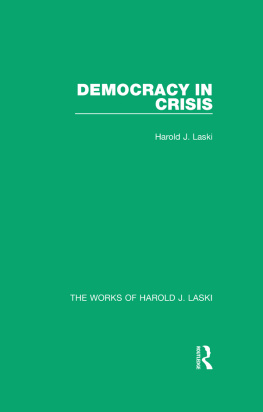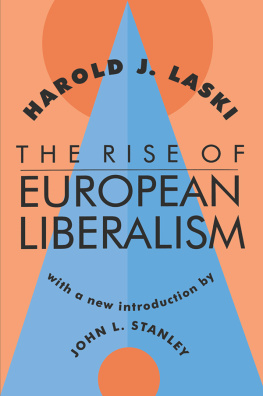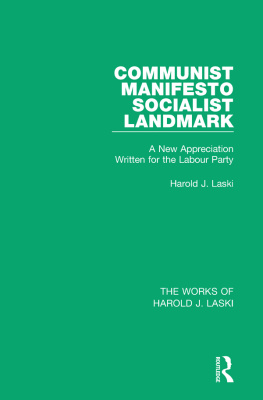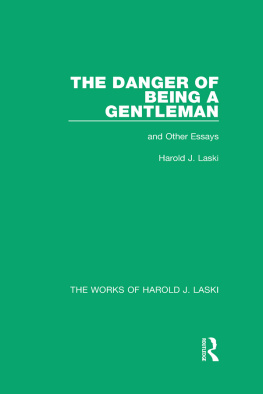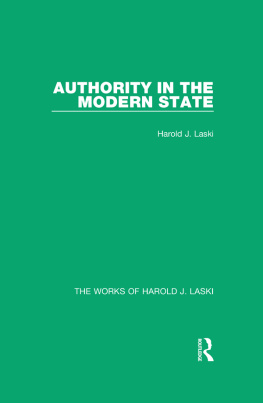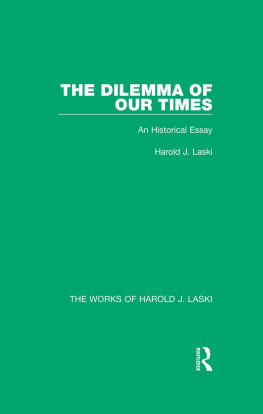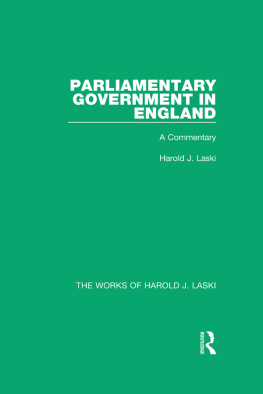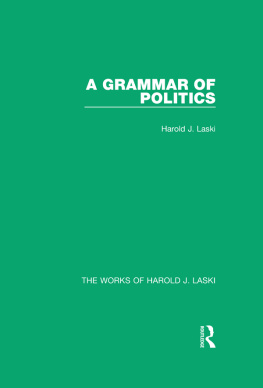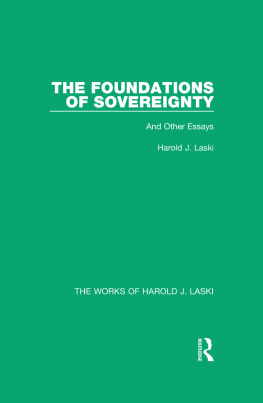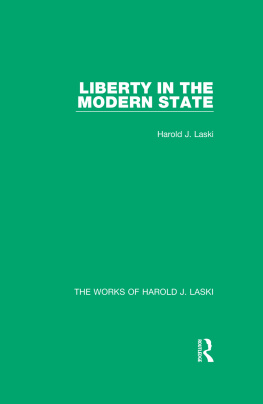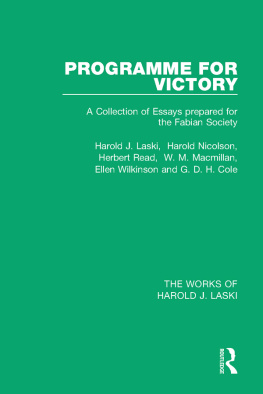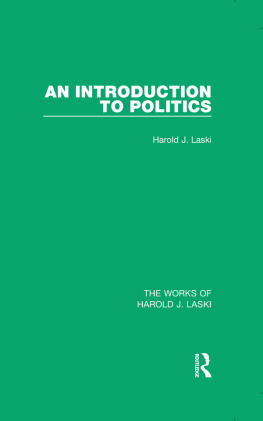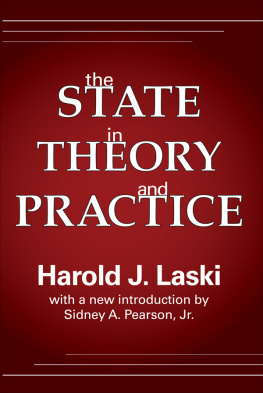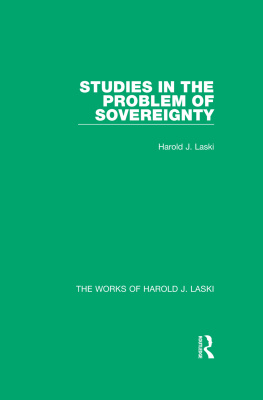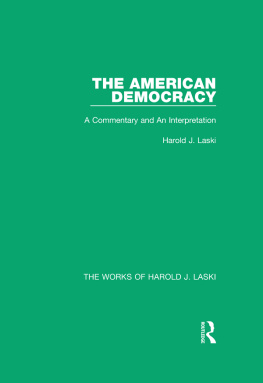THE WORKS OF HAROLD J. LASKI
Volume 7
DEMOCRACY IN CRISIS
First published in 1933
This edition first published in 2015
by Routledge
2 Park Square, Milton Park, Abingdon, Oxon, OX14 4RN
and by Routledge
711 Third Avenue, New York, NY 10017
Routledge is an imprint of the Taylor & Francis Group, an informa business
1933 George Allen & Unwin Ltd
All rights reserved. No part of this book may be reprinted or reproduced or utilised in any form or by any electronic, mechanical, or other means, now known or hereafter invented, including photocopying and recording, or in any information storage or retrieval system, without permission in writing from the publishers.
Trademark notice: Product or corporate names may be trademarks or registered trademarks, and are used only for identification and explanation without intent to infringe.
British Library Cataloguing in Publication Data
A catalogue record for this book is available from the British Library
ISBN: 978-1-138-81912-2 (Set)
eISBN: 978-1-315-74273-1 (Set)
ISBN: 978-1-138-82204-7 (Volume 7)
eISBN: 978-1-315-74262-5 (Volume 7)
Publishers Note
The publisher has gone to great lengths to ensure the quality of this reprint but points out that some imperfections in the original copies may be apparent.
Disclaimer
The publisher has made every effort to trace copyright holders and would welcome correspondence from those they have been unable to trace.
FIRST PUBLISHED IN FEBRUARY 1933
SECOND IMPRESSION MAY 1933
All rights reserved
PRINTED IN GREAT BRITAIN BY
UNWIN BROTHERS LTD., WOKING
To
THE FACULTY OF YALE UNIVERSITY LAW SCHOOL
IN GRATITUDE FOR GRACIOUS AND
STIMULATING HOSPITALITY
FEBRUARY-JUNE, 1931
H.J.L.
This book is an expanded version of the Weil lectures which I delivered in April 1931 to the University of North Carolina. Publication was a condition of their delivery, and I have to thank my friend, President Graham, for the permission to delay their completion for a period beyond my promise.
I am aware that my argument is a pessimistic one, and that it is rooted in a sombre picture of our situation. I do not think any explanation, beyond the argument itself, is called for by its character. I shall be satisfied if I can either persuade a few readers to realise how near our feet lie to the abyssthe usual point at which Englishmen are stimulated to consider principleor, alternatively, be shown by critics to have misunderstood the position. I have arrived at my conclusions with regret, and only after long and careful thought upon the material they summarise. I should have been happier if my conclusions had been in another direction; but the obligation to follow the compulsion of the facts is inescapable.
I owe a deep debt to my colleagues, Mr. H. L. Beales and Mr. K. Smellie, for constant illumination of the themes I have ventured to discuss; and I should like to register here my special obligations to Mr. and Mrs. J. L. Hammond and Professor R. H. Tawney for the insight their books have given me into the general problem of discontent in a democracy. I hasten to add that none of them has any responsibility for my discussion of the themes upon which they have brought so profound and sympathetic an understanding to bear.
The dedication is a slight acknowledgment of infinite kindness. In the months I spent at Yale University in 1931 Dean Clark and his colleagues in the Law and Graduate Schools made me realise how learning can be made an avenue to friendship.
H. J. L.
CONTENTS
DEMOCRACY IN CRISIS
I
Everyone knows the famous passage in which, a generation before its advent, Chesterfield predicted the coming of the French Revolution. All the symptoms, he wrote on December 25, 1763, which I ever met with in history previous to great changes and revolutions in government now exist and daily increase in France. Few of those who controlled its destinies were able to see the significance of the portents he observed. They were as blind to their own fate as the men who, on the eve of the Puritan rebellion, comforted themselves with the assurance that England had never known peace and loyalty so profound.1 Yet, in the one case, as in the other, all the symptoms were present which involve those final adjustments in institutional perspective which men later recognise as marking an epoch in history.
We who have observed the revolutionary experiment in Russia are perhaps not less inclined than our predecessors to minimise its significance. The difference in economic conditions is vast. Our national character, our historical traditions, have made for a very different evolution. Our administrative mechanism is not in decay. Our middle class, for all the losses it has suffered remains strong and conscious of its strength. No party preaching a revolutionary gospel has attained that degree of importance which enables it to make a serious impact upon the mind of the electorate. No important party of the left consciously admits that it is willing to depart from the traditional lines of constitutional method. The armed forces of the state have shown no signs of serious disloyalty to the civil government. Strike after strikeeven, in the case of Great Britain, a general strikehas been met and broken without exceptional loss. The trade unions have been for years upon the defensive; and a rapid decline in their membership has been one of the most marked features of their recent history. If it is true that the economic depression is both dangerous and widespreadmore dangerous and more widespread than any other in the recordits causes are in process of removal. The vicious system of reparations has been ended. The cancellation of inter-allied debts is increasingly recognised as inevitaole. The evil post-war system of economic nationalism has not improbably already passed its zenith. The discovery of an adequate basis of international exchange proceeds more rapidly than could have been hoped before the economic blizzard of 1928. It took a generation for Europe to recover from the grim effects of the Napoleonic wars. It is not, therefore, unlikely that, after a similar period of crisis, the world will discover the foundations of a new equilibrium.
Nothing, certainly, is gained by a denial of the recuperative power inherent in any social system; there is, as Adam Smith insisted, a great deal of ruin in a nation. Yet the careful observer, who is willing to look below the surface, will not, I think, be blind to the presence amongst us of those symptoms which, in the past at least, have usually been the precursors of social convulsion. We confront wide disparities of wealth and power; and these are today so deeply resented that the philosophy of social equality, half-silent since the time of Matthew Arnold, has taken on a new lease of life. The disinherited show signs of those half-conscious but deeply felt protests which are the more moving to their makers because they are unsuccessful; in this aspect the British General Strike, those of Gastonia and Heeren in the United States, have a significance the more important the more carefully they are considered. The repression of discontent has become everywhere more thoroughgoing. The British Trades Disputes Act of 1927 was the first legislation hostile to the trade unions which this country has placed on the statute-book since the Combination Acts of 1799. The use of the injunction in American labour disputes, while probably less important than either its advocates or its opponents pretend,1 has had the dangerous effect of making organised labour in the United States regard the Courts as simply one more instrument on the side of capital in the eternal struggle for economic power.2 The handling of Communists in both Great Britain and America, the terrible treatment to which they have been subjected above all in Poland, Hungary, and Rumania, suggest a temper of hostility to free discussion which has reached very grave proportions; for a regime which persecutes severely is always one that is conscious of a threat to its foundations. The settlement of differences by violenceno doubt a habit in part intensified by the warseems to have become a part of our mental climate in a degree not paralleled since the tragic events of 1848. Italy and Russia are only the final terms in a process of which the end has still to come in other places.

